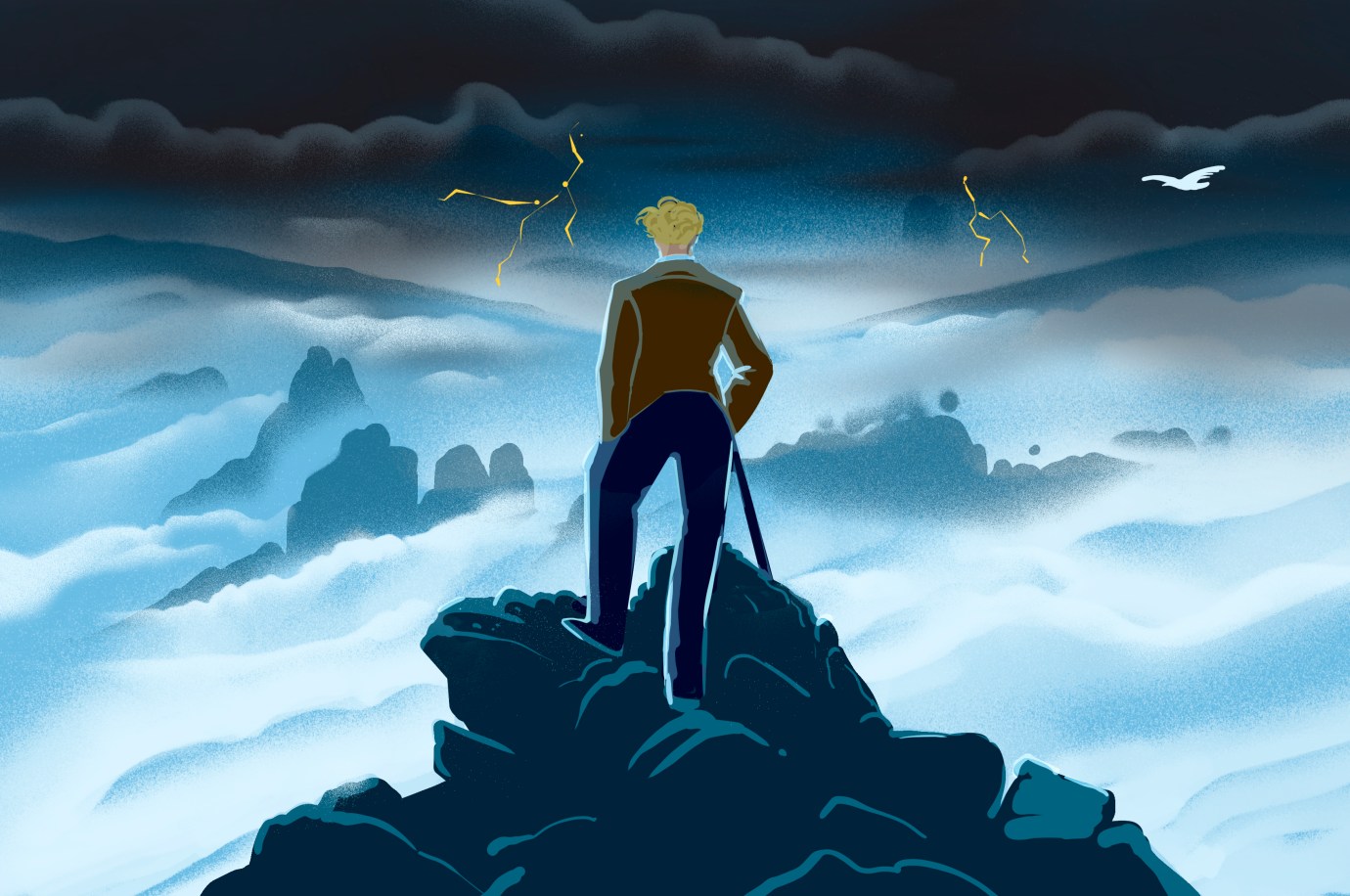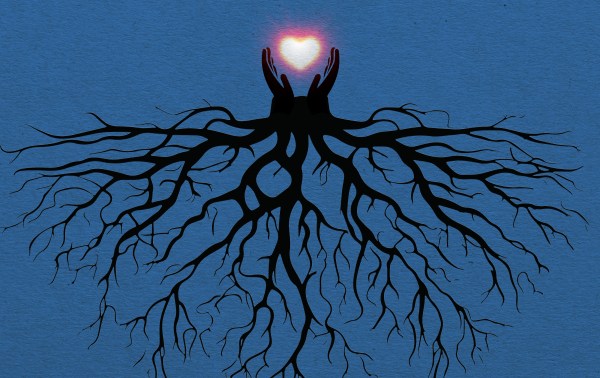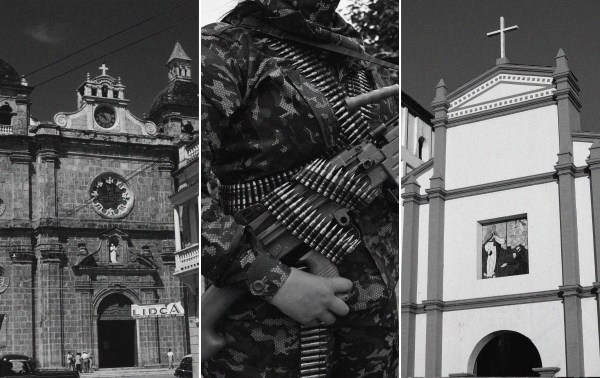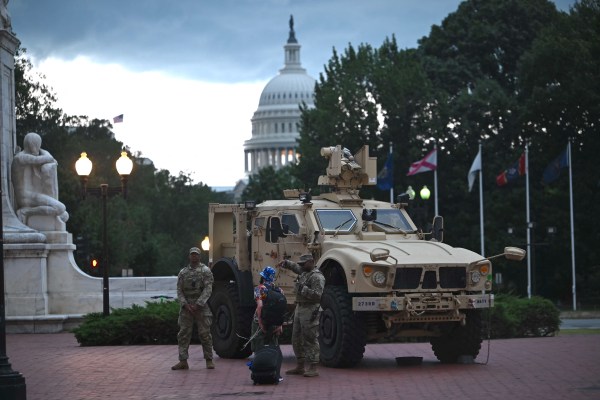Happy Sunday and happy Father’s Day to all you dads (including my own!).
I am spending today with my own kiddos after being in Colorado for most of the week for an event with the Center for Christianity and Public Life. It’s a Washington-based organization, headed by Michael Wear, arguing that Christianity (and Christians) have resources that—when stewarded well—make indelible contributions to our civic life and institutions.
Today’s Dispatch Faith essay argues much the same, at least when it comes to the crises so many men and boys find themselves in today. Daniel J. Wiser, an editor with National Affairs, argues that the Christian church can and should provide examples for men whose upbringings and backgrounds now seem to be more lonely than ever before.
Daniel Wiser Jr.: The Man Who Goes Unnoticed

Something is different about America’s young men since Donald Trump’s second election victory and return to the presidency. This portion of the electorate has continued to move to the right and backed Trump by a significant margin in 2024. And some are now expressing triumph, even glee, about Trump’s comeback. “We’re so back,” a male student at the University of Texas told the American Enterprise Institute’s Survey Center on American Life after the election.
Young men’s views are not monolithic, and some are certainly more critical of Trump than others. But what’s striking about these expressions of triumphalism is how starkly they contrast with the headlines about boys and men in recent years, in which observers on both the left and right have sounded the alarm about their struggles: “It’s No Longer a Man’s World.” “What’s the Matter with Men?” “Men Are Lost.” “America’s Young Men Are Falling Even Further Behind.” “Working-Class Men Are Not Okay.” Whatever boost to male morale Trump’s return has provided, the roots of the crisis of men and masculinity run deep.
Center-left scholar Richard Reeves founded the American Institute for Boys and Men (AIBM) in 2023 to study this crisis and develop solutions. AIBM has reported that working-class men “face dwindling job prospects, stagnant wages, and declining health” in a post-industrial economy and society with changing gender norms. Men without a college degree are more likely to die young from suicide or drug overdoses, to have lower marriage and family-formation rates, and to have fewer supportive friendships. Young men are also less likely than women to enroll in and finish college; as a result, they are more likely to be out of the labor force and living with their parents, to be incarcerated, or to be homeless. And fewer men than women are religious, meaning they have less access to supportive church communities and spiritual mentors who can help them form a relationship with God.
The struggles of men are complex and do not lend themselves to easy policy solutions. Proposals to boost male employment through vocational education, for example—and thereby improve their marriage and family prospects—would certainly help. But the deeper issues go beyond the usual political and culture war debates. They constitute a crisis of meaning and purpose.
An important place to start is the lack of positive role models for boys and young men.
The disappearing father and the manosphere.
Typically, the first man a boy looks up to in his life is his father. Increasingly, however, boys are growing up with no dad in their home: According to Census Bureau data, the percentage of children living without their biological father has risen from 17 percent to 24 percent in the last half-century. Fatherlessness affects all races: Half of black children grow up without their biological father, by far the most of any demographic group. About 29 percent of Hispanic kids are missing their dad. While white children are the most likely to experience the presence of a father in the home, the share of kids without one has increased the most among any race in the last 50 years: from 12 percent to 20 percent.
To fill such voids, boys and young men sometimes turn to troubling figures. Perhaps the most disturbing is Andrew Tate, the kickboxer-turned-influencer of the online “manosphere” who revels in misogynistic rhetoric and offers a vision of masculinity that prizes beautiful women, expensive cars, and physical fitness. European authorities have initiated criminal investigations against Tate, who has been accused of sexual misconduct, human trafficking, and money laundering. Thankfully, Tate’s influence might not be as pervasive as his media attention suggests: Ari Blaff has noted in The Dispatch that surveys have recorded “lukewarm support” for Tate among young men.
Tate, like other members of the manosphere, has expressed support for Trump, again elevating the president as a role model for young men. But Trump, of course, is hardly a moral exemplar—he has had multiple divorces and infamously bragged about his sexual exploits with women. Though he has at times demonstrated courage and resilience in his remarkable political career, much of his tough-guy persona remains performative and shallow. But braggadocio does not offer much to men struggling with a crisis of meaninglessness and both material and spiritual poverty.
Some of the online influencers popular with young men do provide more intellectual heft and practical advice, such as the Canadian psychologist Jordan Peterson. Peterson has enraptured young male audiences and readers with his lectures on the mythological structure of the Bible (drawing on the work of earlier psychologists such as Carl Jung and Joseph Campbell), and his masculinist self-help books have been enormously successful. But while practical skills are vital for boys and men lacking fathers, they need more than self-help and myths—they need the truth about who they are and why they exist.
As for religious figures, those who garner the most attention can sometimes be damaging to young men. Aaron Renn has pointed out that prominent Christian pastors such as Mark Driscoll publicly shame men as lazy cowards if they are unable to find a job and support a family. Men are told to “man up” but without any encouragement or spiritual advice for how to do so.
In search of heroes.
Churches, non-profits, and other organizations all have vital roles to play in strengthening marriages and families so that boys learn from their fathers what it means to be a good man, husband, and dad.
Non-profits such as Communio have worked with churches to offer ministries focused on marriage preparation, relationship skills, and faith development. And these efforts appear to be working—in just a few years after Communio started its work, its programs helped lower the divorce rate in Jacksonville, Florida, by 24 percent. Forge, a Catholic organization in Des Moines, Iowa, is also doing great work “to build a foundation of healthy fathers, strong families, and empowered evangelizers to revitalize the family, transform our culture, and rebuild the Church.”
Research demonstrates that the influence of an engaged and faithful father is just as important, if not more important, than that of a mother in passing along a religious tradition to their children. Being raised in a religious household exposes boys to other “fathers” beyond their biological one—and for Christians, most significantly God the father. Through men’s groups and other ministries, churches and religious institutions can facilitate organic and cross-generational relationships among boys, young single men, married men and fathers, and pastors and priests. Such relationships are invaluable for imparting models of faithful manhood.
All boys and men need heroic roles to fill, and characters to model themselves after. But without good heroes for them to emulate and become, the more they will be pulled into the orbit of the deceptive and extreme.
Heroic discipleship.
If men desperately need heroes, religious traditions must be ready to provide them. They emerge not only from relationships in present-day churches, but from the saints who have guided believers throughout the centuries. For Christians, this of course starts with Christ: The God-man who sacrificed himself on the cross out of love for fallen humanity and out of obedience to his father.
Going back before Christ’s public ministry, St. Joseph, the earthly father who adopted Jesus, lived a life of virtue and holiness that can still serve as an instructive model for men today. A lowly carpenter, Joseph is described in the Gospel of St. Matthew as a just or “righteous man.” When he found out that his betrothed, Mary, was pregnant with a child who was not his, he decided to break off their engagement quietly so as not to “expose her to public disgrace.” (He also wanted to be merciful: The Mosaic law at the time prescribed stoning as a punishment for adultery.)
But after an angel instructed him in a dream to take Mary as his wife—“for the child conceived in her is from the Holy Spirit”—he listened and “did as the angel of the Lord commanded him.” Following Jesus’ birth and the visit of the wise men, Joseph was warned in a dream that he should protect Mary and Jesus and flee with them to Egypt, for Herod, the Roman-appointed king of Judea, felt threatened by the newborn “king of the Jews” and wanted to murder him. And again, Joseph obeyed: He “got up, took the child and his mother by night, and went to Egypt, and remained there until the death of Herod,” later settling with the Holy Family in the obscure town of Nazareth.
It is difficult to imagine the agonizing dilemmas Joseph faced: How could he still embrace Mary as his wife when her child was not his? How could he possibly protect them from the murderous reach of the Roman imperium? But as the Dominican priest Michel Gasnier put it in Joseph the Silent, “he had but one desire, one passion, he longed for one thing only—to carry out the designs of God no matter what the cost.” Amid his struggles and sufferings, Joseph practiced what Pope Francis referred to as “Christian realism”: confronting the mysterious reality of God’s will and “accept[ing] personal responsibility for it … with hope and courage.”
One of Joseph’s most important virtues is not just that he obeyed God’s will, but how he did so. Joseph is not mentioned much by the Gospel writers, and they do not record a single word of his. Pope Francis called him “the man who goes unnoticed, a daily, discreet and hidden presence … remind[ing] us that those who appear hidden or in the shadows can play an incomparable role in the history of salvation.” Joseph protected Mary and Jesus when they were especially weak and vulnerable, and then lived a hidden life of silence, humility, and daily work in Nazareth, years before Jesus would fulfill his salvific role. “The dream of most is that they may make a name for themselves, be distinguished, earn a place in the sun so that the rest of mankind will bow before them,” Gasnier wrote. “Joseph teaches us that true greatness consists in serving God and our neighbor.”
A more recent model of Christian manhood is Bl. Franz Jägerstätter, an Austrian farmer who was executed in 1943 for refusing to fight with the Nazis. (Jägerstätter was beatified by the Catholic Church in 2007 and declared “Blessed.” Cinephiles will recall him as the protagonist in Terrence Malick’s achingly beautiful film A Hidden Life.) Born in 1907 in a small village, Jägerstätter received little formal education and was a bit of a troublemaker in his youth. He fathered a child out of wedlock, a daughter for whom he would provide and visit for the rest of his life. After marrying his devout wife Franziska, he became more committed to his Catholic faith. His deepening piety led him to become sexton at his local parish, managing the church grounds and assisting with Mass and the sacraments.
In a dream in 1938, he saw a gleaming train coming around a mountain with children flocking to it. A voice told him: “This train is going to hell.” He believed God was warning him about the evils of the Nazis. He was the only resident of his village to vote against the Anschluss, the German annexation of Austria, which made every Austrian a German citizen and thus subject to conscription.
Jägerstätter spent a brief period in army training before being allowed to return to his farm and family. But he resolved that he could not serve if summoned again, for the brutal military campaigns of the Nazis directly opposed the teachings of Christ and his church. Imprisoned for his refusal to serve, Jägerstätter wrote to Franziska that “I want to save my life but not through lies.” Franziska replied that she retained a “small hope” that her husband would change his mind, but she also acknowledged the imperative to “do God’s will even when we do not understand it.” Jägerstätter’s continued rejection of compulsory military service resulted in his death sentence.
Meeting with Jägerstätter for the last time in prison, his parish priest recalled: “He said to me: ‘Can you promise me that if I join that movement [the Nazi regime] that I shall not fall into mortal sin?’ ‘That I cannot do,’ I answered. ‘Then I won’t enlist,’ was his reply.” Jägerstätter was executed by guillotine in August 1943. In his last letters to his family, he wrote that he
would have gladly spared you the pain and the suffering that you have borne on account of me. But you surely know that we must love God more than we love our family, and that we must be ready to let go of everything that we love on this earth and that is dear to us rather than to offend God in the least. … I would not exchange my small, dirty cell for a king’s palace if I was required to give up even a small part of my faith. All that is earthly—no matter how much, nor how beautiful—comes to an end. But God’s Word is eternal.
It’s remarkable that Jägerstätter is remembered at all. If not for his biographers Gordon Zahn and Erna Putz, the lonely sacrifice of this uneducated farmer might have soon been forgotten. But he should be regarded today as one of the most heroic figures in the annals of Christian martyrdom. In his prison notebooks, Jägerstätter penned a series of reflections on the Christian life and titled them “What Every Christian Should Know.” “Discipleship to Christ requires heroism,” he wrote. He believed deeply that we cannot save ourselves and are in desperate need of God’s grace, but that we must exercise our free will to choose the Good and obey God above all else. “Our own will is not the basis of our receiving grace,” as he put it. “Yet without our wanting and striving for grace, God cannot send it to us.”
Daily, hidden work.
St. Joseph and Franz Jägerstätter might be regarded as extreme examples to follow; the ordinary American man today is fortunate that he does not have to protect his family from a tyrant like Herod, or sacrifice his life to defy the Nazis. But there is much to learn from their silent and hidden lives: the importance of living a simple and humble life; of facing reality with hope and courage; of serving God and our neighbors, especially the poor and vulnerable; of properly ordering our loves; and of striving to obey the will of God as our ultimate duty. Joseph and Jägerstätter were not perfect, and neither are most men in the Bible—David committing adultery with Bathsheba and then arranging for the murder of her husband Uriah comes to mind—but discipleship is also about perseverance in the face of failures, enabled and empowered by God’s grace. Political scientist Ryan Burge has found that young men in particular are becoming more religious and attending church services more often than young women. Religious leaders say they are seeing more young men fill the pews, from evangelical congregations to ancient and liturgical traditions like Catholicism, Orthodoxy, and Anglicanism. This is an incredible opportunity for young men to deepen their faith, to learn from male mentors in their congregations, and to discover the historical heroes of their religious traditions. There is no quick fix to the crisis of men, but there is a path to long-term renewal: heroic discipleship lived in daily, hidden work.
More Sunday Reads
- Last week’s edition of Dispatch Faith touched on the Southern Baptist Convention’s annual meeting, which took place last week in Dallas. Now that the meeting has concluded, Christianity Today’s Kate Shellnut has a helpful summary of what Baptist messengers voted on, including whether to shutter the denomination’s public policy advocacy arm, the Ethics and Religious Liberty Commission (here’s a bit of background on why some want to shut it down in the first place). “Even with some of the same issues coming up year after year and a significant number of people calling for the Southern Baptist Convention (SBC) to take action, the thousands of blue and yellow paper ballots across a giant convention hall in downtown Dallas didn’t add up to much change this time,” Shellnut writes. “The SBC prides itself on cooperation across differences, so leaders say just being able to work through the proposals without too much antagonism can feel like a win. ‘I think it shows the strength of our gospel unity that we can really talk about these things and it not turn into a brawl,’ said North Carolina pastor and SBC president Clint Pressley, who presided over the two-day meeting in Dallas with a half smile and slick Southern accent. But the outcomes mean some Southern Baptists are leaving with lingering questions and a sense of unfinished business. This was the fourth year in a row that the convention challenged the ERLC and the first time that Southern Baptists got concrete numbers showing how many have lost confidence in the entity, which critics claim is no longer aligned with churches’ political interests. More than 40 percent of those voting on Wednesday were ready to shut it down.”
- For the New York Times, Isabel Kershner profiles one of the Israeli hostages taken by Hamas invaders on October 7, 2023. Kershner explores how Omer Shem Tov, like other abductees, increasingly relied on faith during his captivity, which included doing whatever he could to keep kosher in underground tunnels and taking stock of the miracles that kept him alive. “He had grown up in a largely secular home, and was living a relatively carefree existence after completing his compulsory military service — waiting tables in a steakhouse to earn money for a post-army trip to South America, a popular rite of passage for many Israelis of his age. … A few days into his captivity, he said, he began to speak to God. He made vows. He began to bless whatever food he was given. And he had requests — some of which he believes were answered. ‘You are looking for something to lean on, to hold onto,’ Mr. Shem Tov said in a recent interview at his family home in Herzliya, north of Tel Aviv. ‘The first place I went to was God. I would feel a power enter me,’ he said. ‘Faith kept me going,’ he said, adding, ‘I always believed I would get home, though I didn’t know how or when.’
Religion in an Image










Please note that we at The Dispatch hold ourselves, our work, and our commenters to a higher standard than other places on the internet. We welcome comments that foster genuine debate or discussion—including comments critical of us or our work—but responses that include ad hominem attacks on fellow Dispatch members or are intended to stoke fear and anger may be moderated.
With your membership, you only have the ability to comment on The Morning Dispatch articles. Consider upgrading to join the conversation everywhere.